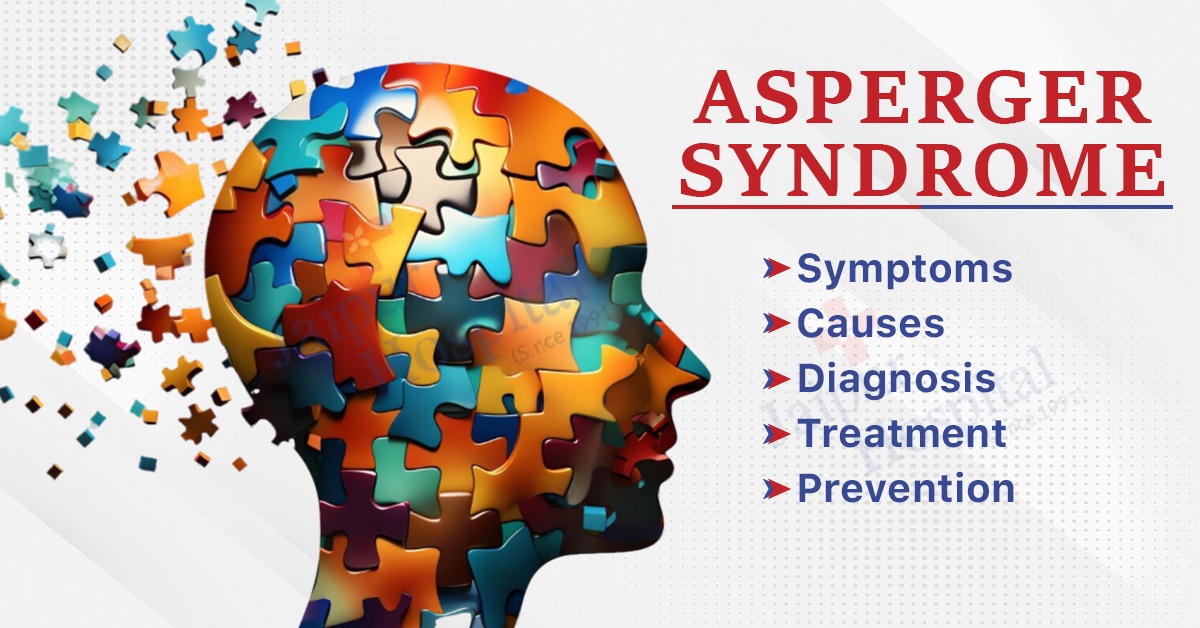Asperger Syndrome, also known as Asperger’s, is a developmental disorder that falls under the autism spectrum. It was first described by Austrian pediatrician Hans Asperger in 1944. Asperger’s is characterized by distinct social and behavioral patterns, which can vary widely from person to person. In this comprehensive article, we will delve into the various aspects of Asperger Syndrome, including its symptoms, causes, risk factors, diagnosis, treatment, and potential prevention strategies.
What is Asperger Syndrome?
Asperger Syndrome is a neurological condition that affects an individual’s ability to interact socially and communicate effectively with others. It is considered a “high-functioning” form of autism, as individuals with Asperger’s often have normal to above-average intelligence. However, they may struggle with certain social and behavioral challenges.
Symptoms of Asperger Syndrome
The symptoms of Asperger Syndrome typically manifest in early childhood and can persist into adulthood. These symptoms often vary in severity and can include:
- Social Difficulties
- Difficulty making and maintaining friendships
- Limited interest in socializing or playing with peers
- Challenges in understanding non-verbal cues, such as body language and facial expressions
- Difficulty empathizing with others’ emotions
- Repetitive Behaviors
- Engaging in repetitive, focused interests (e.g., collecting specific items or learning all about a single topic)
- Adherence to strict routines and rituals
- Insistence on sameness and resistance to change
- Communication Challenges
- Formal and advanced language skills, but difficulty with everyday conversation
- Monotonous or overly formal speech patterns
- Challenges in understanding idiomatic expressions or sarcasm
- Sensory Sensitivities
- Heightened sensitivity or aversion to sensory stimuli, such as bright lights, loud noises, or certain textures
- Intense Focus
- Intense focus on specific interests, often to the exclusion of other activities
- Demonstrated expertise in these areas of interest
- Motor Coordination Difficulties
- Clumsiness or awkwardness in fine and gross motor skills
It’s essential to recognize that individuals with Asperger Syndrome have a wide range of abilities and may not exhibit all of these symptoms. Additionally, some individuals may excel in specific areas, such as mathematics or music, while struggling with social interactions.
Causes of Asperger Syndrome
The exact cause of Asperger Syndrome remains unclear, but it is believed to result from a combination of genetic and environmental factors. Some key factors include:
- Genetics: There is evidence to suggest a genetic component to Asperger’s. Families with one member on the autism spectrum may have an increased risk of having another family member with similar traits.
- Brain Development: Abnormalities in brain development and connectivity, particularly in areas related to social interaction and communication, may contribute to Asperger Syndrome.
- Prenatal Factors: Some research has explored the influence of prenatal factors, such as maternal exposure to certain toxins or infections during pregnancy, on the development of autism spectrum disorders.
- Environmental Factors: Early childhood experiences and exposures may also play a role. For example, exposure to high levels of stress or trauma during early development could impact the expression of Asperger’s traits.
Also read: What are Hormones? Types, Functions, and Diseases
Risk Factors of Asperger Syndrome
While the exact cause of Asperger Syndrome is not fully understood, several risk factors have been identified that may increase the likelihood of developing the condition:
- Family History: Having a family member, particularly a sibling, with autism or Asperger Syndrome increases the risk.
- Gender: Asperger’s is more commonly diagnosed in males than in females, with a ratio of approximately 3 to 1.
- Preterm Birth: Some studies suggest a possible link between preterm birth and an increased risk of autism spectrum disorders, including Asperger Syndrome.
- Maternal Factors: Certain maternal factors, such as older maternal age and exposure to infections or toxins during pregnancy, have been studied as potential risk factors.
- Other Medical Conditions: Children with other medical conditions, such as epilepsy or intellectual disabilities, may have a higher risk of co-occurring Asperger’s.
Diagnosis of Asperger Syndrome
Diagnosing Asperger Syndrome can be complex and typically involves a multidisciplinary approach, including pediatricians, child psychologists, and developmental specialists. The diagnostic process may include:
- Comprehensive Evaluation: A thorough assessment of the individual’s developmental history, behavior, communication skills, and social interactions.
- Observation: Observing the individual in various social and behavioral situations to identify specific challenges and behaviors consistent with Asperger’s.
- Parent and Caregiver Interviews: Gathering information from parents, caregivers, and teachers about the individual’s behavior and developmental milestones.
- Psychological Testing: Standardized tests and questionnaires may be used to assess cognitive and social-emotional functioning.
- Ruling Out Other Conditions: It’s important to rule out other conditions, such as intellectual disabilities or language disorders, that may mimic some aspects of Asperger Syndrome.
The diagnostic criteria for autism spectrum disorders underwent significant changes with the publication of the Diagnostic and Statistical Manual of Mental Disorders, Fifth Edition (DSM-5). As a result, Asperger Syndrome is no longer diagnosed as a separate disorder; instead, individuals are diagnosed with Autism Spectrum Disorder (ASD) with varying levels of severity.
Also read: Depression: Causes, Symptoms, Types, Risk Factors & Treatment
Treatment of Asperger Syndrome
Although there is no cure for Asperger Syndrome, early intervention and targeted therapies can help individuals with the condition develop essential social and communication skills. Treatment plans are often tailored to the individual’s specific needs and may include the following components:
- Behavioral and Communication Therapy:
- Applied Behavior Analysis (ABA): A structured approach to improving behavior and communication through positive reinforcement.
- Social Skills Training: Teaching individuals with Asperger’s how to navigate social situations, interpret social cues, and develop friendships.
- Speech and Language Therapy: Focusing on improving verbal and non-verbal communication skills, including understanding and using idiomatic expressions.
- Occupational Therapy: Addressing sensory sensitivities and motor coordination difficulties to enhance daily functioning.
- Individualized Education Plan (IEP): Creating a tailored education plan to support academic progress and social development within the school setting.
- Medication: In some cases, medication may be prescribed to manage symptoms such as anxiety or mood disorders that often co-occur with Asperger’s.
- Parent and Caregiver Support: Providing education and training to parents and caregivers to help them better understand and support their child’s unique needs.
- Peer Support Groups: Encouraging individuals with Asperger Syndrome to connect with others who have similar experiences can be beneficial in reducing feelings of isolation.
Complications of Asperger Syndrome
Living with Asperger Syndrome presents unique challenges, and individuals may encounter various complications throughout their lives. Some potential complications include:
- Social Isolation: Difficulty forming and maintaining relationships can lead to social isolation and loneliness.
- Bullying and Teasing: Children and adolescents with Asperger’s may be targets of bullying and teasing due to their social differences.
- Anxiety and Depression: Co-occurring mental health conditions, such as anxiety and depression, are relatively common among individuals with Asperger’s.
- Academic and Occupational Challenges: Difficulties with communication and social interaction can affect academic and occupational success.
- Difficulty with Transitions: Resistance to change and insistence on sameness can make transitions, such as moving to a new school or starting a new job, particularly challenging.
Prevention of Asperger Syndrome
Asperger Syndrome itself is not preventable, as it is believed to result from a complex interplay of genetic and environmental factors. However, there are steps that can be taken to improve the quality of life for individuals with Asperger’s and reduce the risk of certain complications:
- Early Intervention: Identifying and addressing developmental and behavioral challenges as early as possible can significantly improve outcomes for individuals with Asperger Syndrome.
- Education and Awareness: Raising awareness and understanding of autism spectrum disorders in the community can reduce stigmatization and promote acceptance.
- Supportive Environment: Creating a supportive and inclusive environment at home, in school, and in the workplace can help individuals with Asperger’s thrive.
- Research and Innovation: Continued research into the causes and treatments of Asperger Syndrome may lead to improved interventions and support services.
Conclusion
Asperger Syndrome is a complex developmental disorder that affects social interaction, communication, and behavior. While there is no cure, early intervention, and tailored therapies can help individuals with Asperger’s develop essential skills and lead fulfilling lives. By understanding the symptoms, causes, risk factors, diagnosis, treatment options, and potential prevention strategies, we can better support those with Asperger Syndrome and promote acceptance and inclusion in society.


